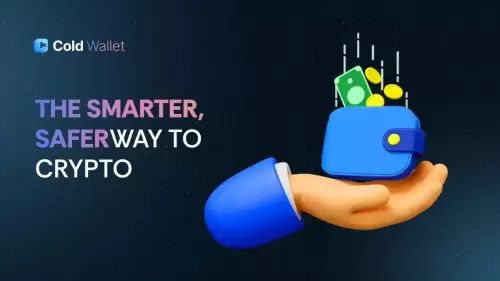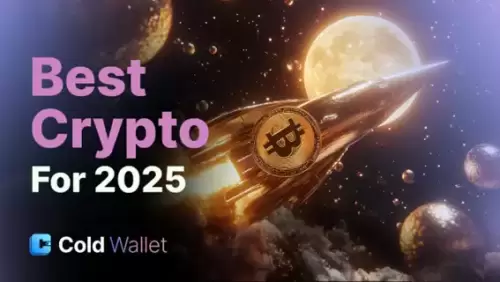 |
|
 |
|
 |
|
 |
|
 |
|
 |
|
 |
|
 |
|
 |
|
 |
|
 |
|
 |
|
 |
|
 |
|
 |
|
Articles d’actualité sur les crypto-monnaies
Bitcoin Now Less Volatile Than the S&P 500 and the Nasdaq
May 14, 2025 at 02:05 pm

In a crypto market where volatility is usually the name of the game, Bitcoin has just crossed an unexpected threshold: it is now less volatile than the S&P 500 and the Nasdaq.
This subtle but significant shift, revealed by Galaxy Digital, challenges a decade of perception of an asset deemed too risky for traditional portfolios. More than a simple technical indicator, this signal could mark a lasting change in status for the first cryptocurrency.
On May 12, Galaxy Digital highlighted in its latest report that Bitcoin’s 10-day realized volatility had fallen to 43.86, a level now lower than the S&P 500 (47.29) and Nasdaq 100 (51.26).
This is considered an unusual position for a crypto historically known for its instability.
"It’s noteworthy that despite the recent market turbulence, major stock indices saw their 10-day realized volatilities increase to 47.29 for the S&P 500 and 51.26 for the Nasdaq 100, compared to 39.84 for Bitcoin," Galaxy analysts observe in their report.
This shift comes as traditional markets show signs of fragility, especially since Donald Trump’s surprise announcement on April 2 regarding the “tariff liberation day”, which amplified international economic tensions.
In this context, Bitcoin has not only stabilized but has risen by 11 % over the period, sharply contrasting with the stagnation of stock indices. Several major economic indicators, meanwhile, have experienced increased volatility :
This situation is reminiscent of that observed in 2018–2019 during trade tensions between the United States and China, a period during which Bitcoin had already established itself as a safe-haven asset.
This parallel highlights an emerging dynamic. In phases of systemic crisis, Bitcoin tends to behave as a macroeconomic counter-asset, a role until now reserved for commodities such as gold.
Beyond recent fluctuations, Galaxy Digital identifies a deeper trend: the decline of Bitcoin’s beta relative to major indices, despite still high 30-day correlations with the S&P (0.62) and Nasdaq (0.64).
This risk profile change indicates that “investors are beginning to see Bitcoin less as a high-risk asset and more as a long-term allocation”, comments Chris Rhine, Head of Liquid Strategies at Galaxy.
In other words, Bitcoin would be moving out of the speculative assets category to join the sustainable portfolio components.
This evolution is also supported by the rise of institutional liquidity. Hank Huang, CEO of Kronos Research, notes that ongoing inflows towards ETFs and recurring strategic Bitcoin purchases “help transform it into a digital version of gold, less correlated with equities”.
This stabilization is made possible, according to Galaxy, by a market “tactically cautious but structurally constructive”, characterized by disciplined leverage usage and low pressure on hedging strategies. With 95% of total Bitcoin supply already mined, the asset’s mechanical scarcity reinforces this maturity dynamic.
This transformation could ultimately reshape the landscape of international reserves. On April 25, Jay Jacobs, Head of Thematic ETFs at BlackRock, noted that states are gradually reducing their dependence on the dollar to turn to alternative assets such as gold… and now Bitcoin. “Geopolitical fragmentation fuels demand for uncorrelated assets”, he explained, explicitly mentioning Bitcoin’s growing role as a safe haven alongside the precious metal.
Clause de non-responsabilité:info@kdj.com
Les informations fournies ne constituent pas des conseils commerciaux. kdj.com n’assume aucune responsabilité pour les investissements effectués sur la base des informations fournies dans cet article. Les crypto-monnaies sont très volatiles et il est fortement recommandé d’investir avec prudence après une recherche approfondie!
Si vous pensez que le contenu utilisé sur ce site Web porte atteinte à vos droits d’auteur, veuillez nous contacter immédiatement (info@kdj.com) et nous le supprimerons dans les plus brefs délais.
-

- Wewake: les investisseurs affluent vers la crypto de prévente en tête alors que l'intégration sans portefeuille prend le devant de la scène
- Aug 03, 2025 at 01:29 am
- Wewake attire l'attention des investisseurs majeure avec sa blockchain innovante sans portefeuille et sans gaz sans gaz. Est-ce l'avenir de l'adoption de la cryptographie?
-

- MEME COINS en 2025: investissement, potentiel de hausse et chats à la traîne?
- Aug 03, 2025 at 01:15 am
- Naviguer dans l'engouement de la pièce MEME de 2025, en se concentrant sur les opportunités d'investissement, le potentiel à la hausse et les pièces hors concours comme Troller Cat, Punisher Coin et autres.
-

- Bitcoin, XRP et The Price Drop Blues: Qu'est-ce que Shakin 'en crypto?
- Aug 03, 2025 at 12:00 am
- Le prix du visage Bitcoin et XRP baisse au milieu de la volatilité du marché, avec des opinions d'experts et des sentiments communautaires ajoutant du carburant à l'incendie. Qu'est-ce qu'un investisseur à faire?
-

- Cold Wallet, Troncoin et Shiba Inu: naviguer dans la cryptographie dans la jungle en béton
- Aug 03, 2025 at 12:00 am
- Explorez le potentiel de Cold Wallet (CWT) avec ses offres de prévente, aux côtés des gains stables de Troncoin et de la rupture potentielle de Shiba INU. Découvrez les idées et les tendances clés.
-

- Crypto Presales: naviguer dans le battage médiatique avec la blockchainfx et au-delà
- Aug 03, 2025 at 12:00 am
- Découvrez la dynamique des préventes cryptographiques, en se concentrant sur la blockchainfx ($ bfx), Lyno AI et les tendances plus larges façonnant les premières opportunités d'investissement sur le marché de la cryptographie.
-

- Bank of America, Ripple et RLUSD: une nouvelle ère en finance numérique?
- Aug 02, 2025 at 11:12 pm
- Bank of America explore le RLUSD de Ripple pour la modernisation des paiements au milieu des progrès réglementaires, révolutionnant potentiellement les transactions transfrontalières et la gestion des actifs numériques.
-

-

-






























































